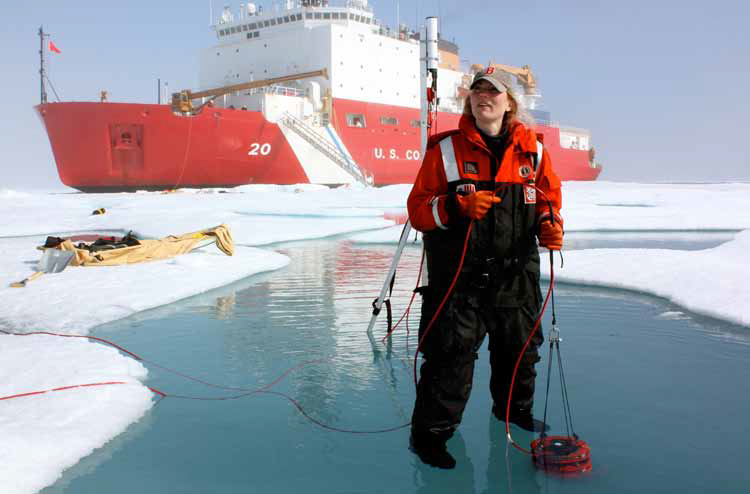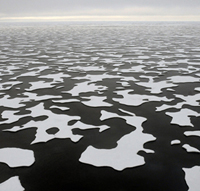
Karen Frey, associate professor in the Graduate School of Geography at Clark University, in collaboration with researchers at the University of Washington, the National Aeronautics and Space Administration (NASA), and the U.S. Army Cold Regions Research and Engineering Laboratory (CRREL), received a grant from NASA for their project titled “Observing and understanding the impacts of a thinning and retreating sea ice cover on light propagation, primary productivity and biogeochemistry in the Pacific Arctic Region.” The Clark portion of the grant is $614,339 distributed over three years.
Frey notes that included in the project will be a strong educational component involving the training of two Ph.D. and several undergraduate students, as well as comprehensive student involvement in research subcomponents at affiliated institutions, which include Dartmouth College and the University of Washington.

the Chukchi Sea. (Photo
copyright Karen Frey)
According to Frey, research to date shows that Arctic sea ice is undergoing tremendous change, notably in the area of the Chukchi and Beaufort Seas north of Alaska. Thirty years ago, much of this region was covered by sea ice over the entire year, where in recent years this sea ice has been replaced by open ocean over the summer months.
“There has been a pronounced decrease in the summer sea ice extent, an overall thinning of the ice, and a lengthening of the summer melt season,” she explains, “all of which have profound consequences for the cycling of carbon as well as the dynamics of the entire food web throughout the region.”
An important outcome of these trends is increased availability of sunlight to the water and organisms beneath and associated with the ice. Increased sunlight promotes the growth of algae in the ocean; however, that growth may also be followed by an increase in the amount of decaying organic matter that interferes with the absorption of sunlight.
To better understand the complex relationships between ice melt, sunlight availability, organism growth and water biogeochemistry, Frey and her team will create computer model simulations using data related to ice retreat and ocean biology/biogeochemistry they gather from field observations and satellite-based imagery.
The team eventually plans to integrate their research with that of previous and ongoing field programs, including those from NASA’s ICESCAPE and Operation IceBridge programs, Office of Naval Research projects studying marginal ice zone conditions, National Science Foundation (NSF) Arctic Observing Network (AON) ice-tethered platform work, and the NSF Distributed Biological Observatory.
Established in 1921, the Graduate School of Geography at Clark University is internationally renowned for innovative scholarship and is an acknowledged leader in the field. Consistently ranked as one of the top-ten graduate programs by the National Research Council, Clark Geography enables graduate students to train with top professionals and participate in a world-class research community. Having awarded more Ph.D.s than any other geography program in the United States, Clark University Geography has a reputation for training future leaders in the field.


